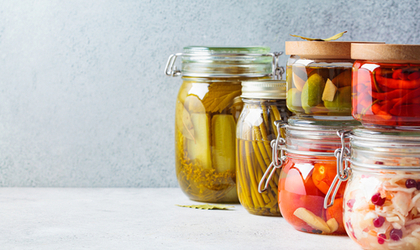
Vitamin C is a bit of a household name. We know it’s found abundantly in oranges, and many of us turn to it to stave off winter colds. Some of us may also be aware that sailors got scurvy when they didn’t eat enough of it.
But there’s so much more to vitamin C than this. Here, we take a closer look at what vitamin C does in the body.
What is vitamin C?
Also known as ascorbic acid, vitamin C functions as an antioxidant. Antioxidants are natural molecules that help stabilise free radicals, unstable compounds that contribute to damage (oxidative stress) in the body.
Vitamin C is an ‘essential’ vitamin, meaning it can’t be produced or stored in the body, so you need to get enough from your diet each day. Fortunately, you can find vitamin C in a range of fresh fruits and vegetables.
What does vitamin C do for the body?
Vitamin C is instrumental for good overall health, contributing to the:
-
Normal collagen formation of gums, skin, bones, and blood vessels
-
Normal function of cartilage (the tough tissue lining joints)
-
Normal function of the immune system
-
Protection of cells from oxidative stress
-
Normal psychological function
-
The reduction of tiredness and fatigue
What are the symptoms of low vitamin C?
Since the body can’t manufacture vitamin C, you need to ensure a plentiful supply from your diet. If, however, you eat very little food, smoke, are pregnant or breastfeeding, generally don’t have a varied, balanced diet, or consume next to no fresh fruit and vegetables, you may run the risk of falling short in vitamin C.
The first symptoms of low vitamin C include:1
-
Muscle and joint pain
-
Tiny red-blue spots that resemble bruises on the skin
-
Tiredness and weakness
-
Easy bruising
-
Splitting hair
-
Dry skin
-
Nose bleeds
-
Poor wound healing
Though rare, a chronic and persistent lack of vitamin C can develop into a condition called scurvy, which occurs when you haven’t had vitamin C in your diet for 3 months.2
How much vitamin C is there in an orange?
Oranges are commonly thought to be rich in vitamin C. And while they do, admittedly, provide a healthy amount of vitamin C, delivering around 53mg per 100mg, many other plant foods contain more vitamin C than this classic citrus fruit.
What foods have vitamin C?
Vitamin C is also readily available in scores of fresh fruit and vegetables. Peppers, berries, kiwi fruit, oranges, broccoli, kale, papayas, chillies, and tomatoes contain some of the highest concentrations of vitamin C.
How much vitamin C do you need per day?
According to the NHS, adults need 40mg of vitamin C daily.3 Pregnant women, meanwhile, require 50mg and children need around 25-35mg each day.
How best to supplement with vitamin C
Theoretically, you should be able to get enough vitamin C from a varied, balanced, wholefood diet. However, vitamin C is a highly unstable compound and easily destroyed by peeling, freezing and cooking. That’s why supplementing with a quality vitamin C tablet can be a helpful insurance policy.
There are many ways to supplement with vitamin C:
Time-release vitamin C tablets
Time-release vitamin C tablets keep the nutrients in micro pellets that release over 6 hours. This design allows the gut to absorb a higher level, so there’s less waste and a steadier amount of vitamin C in the bloodstream.
Powdered vitamin C
Powdered vitamin C is an excellent choice for children or older adults who struggle to swallow traditional It’s also an excellent choice if you wish to supplement with large amounts of vitamin C.
Multivitamins
A multivitamin is the most convenient and economical way to ensure all your nutritional bases are covered, including your vitamin C needs.
Where in the body is vitamin C absorbed?
Once consumed, vitamin C is absorbed by the ileum and jejunum – the middle section of the small intestine.4
Is vitamin C important in iron absorption?
Vitamin C also supports iron absorption, making it a great multi-tasker. It captures non-haem iron – which is found in plant-based foods, like spinach – and stores it in a more bioavailable (readily absorbed) form in the body.
Why should I take vitamin C with zinc?
Nutritionists often suggest taking vitamin C and zinc together since they both contribute to the normal function of the immune system.
Want to learn more about supplementing with vitamin C or any of our vitamin C tablets? Drop a line to one of our expert Nutrition Advisors, who are always happy to offer free, confidential advice. Simply click the chat button located at the bottom right-hand of our website.
References:
- Scurvy. (2021). https://www.nhs.uk/conditions/scurvy
- Scurvy. (2021). https://www.nhs.uk/conditions/scurvy
- Vitamins and minerals - Vitamin C. (2021). https://www.nhs.uk/conditions/vitamins-and-minerals/vitamin-c/
- Robert B. Rucker, Francene Steinberg, Vitamin C, Editor(s): William J. Lennarz, M. Daniel Lane, Encyclopedia of Biological Chemistry, Elsevier, 2004, 367-371.
You Might Also Like

Keri
Keri Filtness has worked in the Nutrition Industry for 19 years. She is regularly called upon for her professional comments on health and nutrition related news. Her opinions have been featured by BBC3, Prima, Vitality, The Mirror, Woman’s Own and Cycling Weekly, amongst others. She has also worked one to one with journalists, analysing their diets and health concerns and recommending changes and additions, where appropriate.
View More






